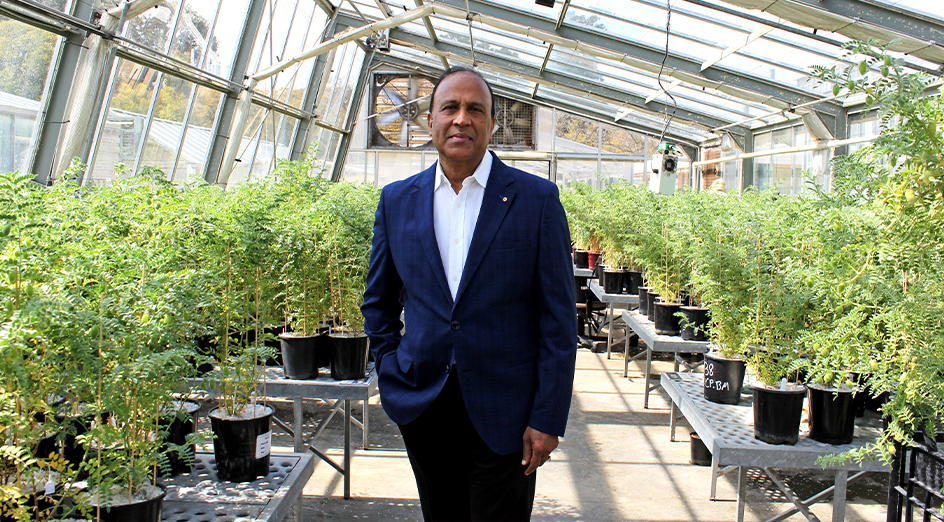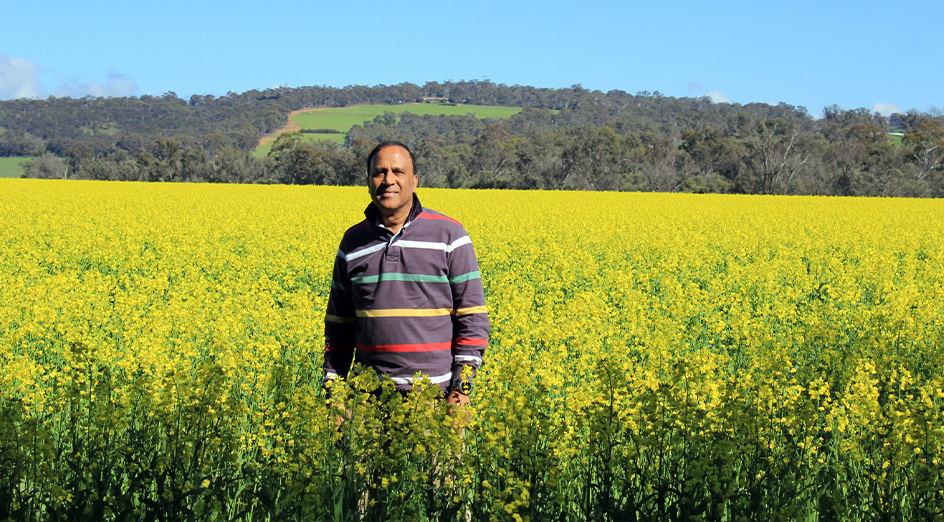Agricultural research and innovation leading global response to climate change

By Thomas Smith
Innovative research from The University of Western Australia is leading a global response to some of the most complex challenges of climate change.
Floods, drought and rising temperatures are impacting the lives of people in almost every region.
And of great concern is the risk climate change brings to global food and nutritional security.
The United Nations (UN) has placed hunger on its list of Global Issues impacting the world today and in the future.
Climate change makes it more difficult for farmers to produce crops and livestock.
Even a marginal decline in crop yield can trigger a ripple effect throughout the world, leading to food shortages and inflation.
Also, on the UN’s list of Global Issues is record population growth. Today, the population of the world is more than eight billion and the UN predicts it will reach a peak of 10.3 billion by mid-2080.
According to current estimates, food production must double by 2050 to match population growth.
The impact of climate change on crop yield, combined with population growth, places food security at the top of a growing list of critical issues that must be addressed.
UWA is leading research to help farmers adapt to changing environmental conditions by pushing the boundaries of traditional agriculture.
Researchers at The UWA Institute of Agriculture (IOA) are working with farmers in some of the world’s harshest environments.
Efficient water use, dry land agriculture and adapting crops that can survive in a changing climate are among the many ways UWA is reshaping global agriculture through scientific research.
UWA’s role in reshaping global agriculture
The IOA is reimagining traditional farming through the development of a more agile, less labour-intensive and technology-led industry.
Leading the IOA’s research is a man who has dedicated his life and career to improving agriculture through science – Hackett Professor Kadambot Siddique, IOA Director.
Professor Siddique is an internationally renowned agricultural scientist who has spent more than four decades immersed in research, training, technology exchange and industry development.

“The world today is facing many complex challenges,” Professor Siddique said. “Climate change and record population levels present an increasing threat to global food security.
“I believe that the University’s strategy in combating these challenges through science, technology and innovative research can unlock the answers we seek.”
Temperature, water and soil quality must remain within optimal levels for crops to grow and climate change affects this delicate balance.
Doubling food production to feed a 25 per cent rise in global population brings even greater challenges to the industry.
“I consider agriculture to be the mother of all sciences,” Professor Siddique said.
“Agriculture must evolve and adapt to our natural environment. It is no longer about just planting seeds, driving tractors and kicking soil.
“The digital age of agriculture is already here. We rely on GPS technology, drones, sensors, robotics, machines and learning from big data.
“This is where technology meets science. Agriculture is adapting to our changing world through cell biology, nanotechnology, and genomics genetics.”
The challenges facing the global agriculture are many. How do crops survive in arid, dry farming systems, or regions affected by floods? How can we sustain and increase crop yield?
“Industry, research and government collaboration is vital in our search for solutions to the challenges facing the world,” Professor Siddique said
“We have established significant connections with the agriculture industry within Australia and internationally. This includes many universities around the world engaged in agriculture research, teaching and industry development.
“The IOA is pursuing a number of research themes including crop roots and rhizosphere, genetics and breeding, sustainable grazing system, water for food production, food quality and human health.
“Our research is focused on unlocking agriculture engineering solutions for food production, agribusiness and ecosystem.”
The search for answers to agriculture’s present and future challenges requires the international community working together in sharing data and experience to understand and solve problems.


Since his days as a student, Professor Siddique understood the vital importance of field work and engagement with farmers.
His hands-on, practical approach ensured a thorough understanding of the complex challenges facing the agriculture industry.
Completing his PhD in less than four years, his research produced several published papers and proved critical in the early growth of Australia’s then non-existent chickpea and pulse industry.
“After completing my masters at Indian Agriculture Research Institute, I worked with grain legumes in Aleppo, Syria, at the International Centre for Agricultural Research in the Dry Areas,” Professor Siddique said.
“I often thought the drylands climate of Australia would be similar to that environment, so I wanted to do my PhD on chickpeas at UWA, but I was told to work on something else.
“The chickpea was nothing in Australia then. But I insisted, and it was the first PhD on chickpeas completed in Australia. Today, we have a thriving pulse export industry in this country.”
Australia is now the world’s largest exporter of chickpeas, producing about one-third of global exports over the past 10 years.
Professor Siddique has contributed immeasurably to that growth, having developed 13 new varieties of pulses, including seven chickpea varieties.
Among these is the very successful “Kimberley Large” Kabuli chickpea, grown in the Ord River Irrigation Area, which consistently yields large-sized peas.
Professor Siddique’s work has been instrumental in developing opportunities for yield improvements in wheat and pulses across southern Australia.
His international collaborations include ground-breaking projects with researchers in China, India, Pakistan, the Middle East, Timor-Leste and Africa.
“It’s important to me that our research is making a difference to agriculture,” Professor Siddique said. “I enjoy working on practical problems and applying a scientific rigour out in the field.”
The UWA Institute of Agriculture
Re-established in 2006, the IOA has a clear vision.
“Our vision is to foster innovation and provide research-based solutions to food and nutritional security, environmental sustainability and agribusiness,” Professor Siddique said.
“The Institute works with the agricultural and natural resource sectors to create knowledge and improve workforce skills, contribute to local and regional prosperity and exercise responsible stewardship of the environment.
“UWA Agriculture is now rated number one in Australia and 9th in the world in Agriculture (ARWU, 2024 ranking). I am surrounded by very clever, passionate people and I’m immensely proud of what we have achieved together.”
Professor Siddique wants to ensure that the next generation of researchers is equipped to meet the imminent threats facing agriculture – climate change and sustainability – and that the industry more broadly rises to the challenge of feeding the world.
“Around 800 million people throughout the world go hungry every day, and that number is rising,” Professor Siddique said.
“The average Australian farmer produces enough food to feed 150 people at home and 450 people overseas – that’s not a bad effort.
“However, the United Nations predicts that by 2050, agricultural production must increase by at least 50 per cent globally to meet food demand.
“Key to overcoming hunger and malnutrition is greater funding and support for innovative, impactful agricultural research that is conducted in collaboration with industry and working with farmers.”
Solving problems through research, transferring knowledge to regions impacted by climate change, and ensuring the IOA continues to grow by inspiring the next generation of students, is key to the professor’s vision.
“We may not be able to feed Asia entirely, but we can certainly help them feed themselves by building their capacity with our knowledge and technology,” Professor Siddique said.
“I believe that UWA’s strategy in combating global challenges through science, technology, innovative research and building capacity can help solve many problems.
“There is a great demand for agricultural graduates all over the world, due to the complex food production system and the challenges the world faces in relation to food security.
“We must work together to find solutions, share this knowledge and ensure future generations have the food they need to survive and flourish.”



